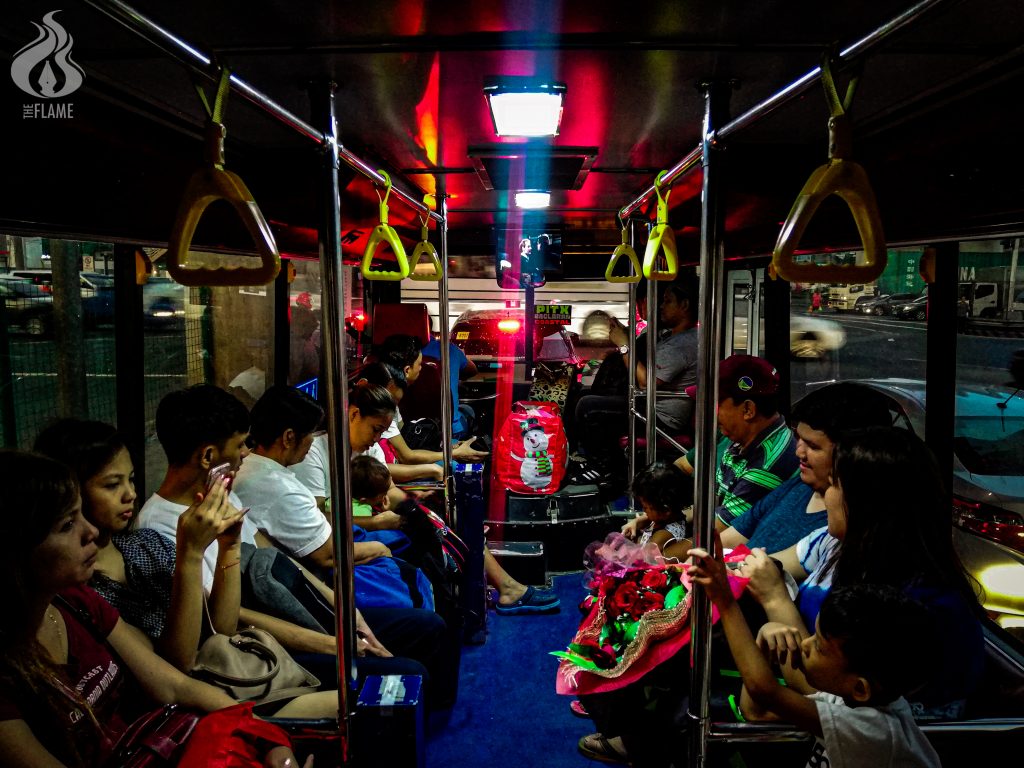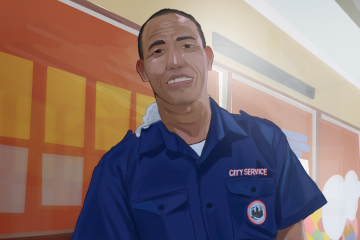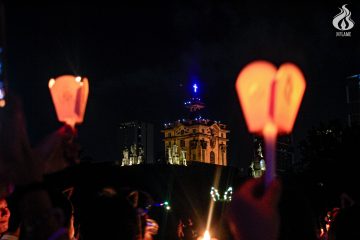
THE DAWN is yet to break, but jeepney driver Ronnie Alvarez is already preparing for a tough day ahead.
Instead of sleeping soundly in his bed, he is sitting on the driver’s seat of his jeep, revving its engine. As a driver for seven years, Alvarez is among the thousands of jeepney drivers who carried his fellow Filipinos from one street to another.
Alvarez’s route passes through the busy streets of España, catering to most of the students and employees of the University of Santo Tomas (UST). But since the COVID-19 pandemic, the number of passengers decreased because of the online setup.
“When there were still classes in UST, I would bring home P1,500 in a day. Now I only bring home P 400 because P 1,200 of my earnings go to crude,” Alvarez said.
Despite the rising gas prices and lesser passengers on his route, Alvarez still worked on the same schedule: from four in the morning until seven at night.
To make ends meet, Alvarez had to find other ways to survive. He shared that he also worked as a tricycle driver despite the risk of getting caught by the police.
“I tried driving tricycles. Sometimes, I even hid from the police,” Alvarez said.
Transportation officials announced last June that they would implement the second tranche of fuel subsidy that seeks to help 264,578 drivers hit by rising fuel prices. The first tranche involved the distribution of 6,500 pesos and targeted more than 377,000 beneficiaries. Drivers who wish to avail of the subsidy must acquire a Pantawid Pasada Program ATM card.
Alvarez has yet to receive his fuel subsidy.
“We haven’t received anything yet because we do not have a card, and it usually goes to the operator,” he said.
With the improvement of the COVID-19 infections comes a reality that the quality of life has not necessarily improved for some workers in Manila. As cases climbed and fell, prices followed.
Commuting hassle
Among the daily commuters is Assoc. Prof. Chuckberry J. Pascual of the Creative Writing department. Scorched under the Manila sun, Pascual waited among hundreds who are relying on public transportation to reach their destinations.
“You can really feel the difference between Alert Level 1 [to other alert levels] […] it’s so difficult to catch a ride,” Pascual said, referring to the most lenient status that allows businesses and offices to operate in full capacity.
With schools beginning to opt for a face-to-face learning set-up, Pascual expressed concern that the return of on-site work would make commuting harder. He added that higher fares are expected with the rising fuel prices, worsening the commuting experience for everyone.
Pascual welcomed the growing trend of biking, widely seen as a response of to the traffic problem and the lack of efficient public transportation.
In 2021, the transportation department supervised the construction of 313.12 km of bike lanes in Metro Manila. This bike lane passes through 12 cities: Pasig, Marikina, Quezon City, Caloocan, Manila, San Juan, Mandaluyong, Makati, Pasay, Las Piñas, Parañaque, and Taguig.
“If Manila was just bike-friendly and if face-to-face classes resumed, I would buy a bike and ride it to work. It’s either that or walking. As much as possible, I don’t want to ride a jeepney. I also don’t want to book a Grab because it’s too expensive,” Pascual said.
Pascual believes the current transportation system is not sustainable for resuming face-to-face classes.
“I am dreading the return to face-to-face classes because commuting will get harder. Fare prices will also rise because of increasing gas prices,” the creative writing professor said.
Struggling sector
A jeepney driver for 14 years, Piston president Mody Floranda witnessed the different struggles of drivers and commuters, including spiralling fuel prices, traffic congestion, and unwarranted violations.
Piston, which stands for Pinagkaisang Samahan ng mga Tsuper at Operators Nationwide (roughly group of united drivers and operations nationwide), has been critical of the government’s transportation policies.
Mody said these problems have cost the livelihood of many, including his co-drivers. From honking around the streets of Manila, some had to resort to other means to survive. He claimed some drivers’ wives have opted to work as housekeepers to keep their families afloat.
Floranda claimed that the Philippine public transportation has been in a “crisis” for almost three years. According to him, changes in ordinances have resulted in fewer public utility vehicles.
“We do not have a QR code or special permits that allow us to service commuters,” the transport group leader said.
The average diesel price as of July 2022 is P87.31 per liter, whereas last January, it was only P43.94 per liter. The net increase in diesel prices from January to July 2022 was P43.37 per liter.
As much as they wanted to get back on the steering wheel, their desire is eclipsed by newly-imposed regulations and fuel prices. Some of their jeepneys, once shining and full of passengers, are now empty and covered in dust.
Piston, is continuously calling on various sectors to help the transport sector. It is also asking the Marcos administration to review and assess existing tax measures, including those related to oil products.
“As long as laws like e-VAT (expanded value dded tax), TRAIN (Tax Reform for Acceleration and Inclusion) law, and excise tax exist, only foreigners and capitalists will benefit from it, and the large percentage of our citizens are victims of such negligence,” Floranda said.
Fuel price hikes create a domino effect not only on transportation but goods and services, ultimately affecting all Filipinos, he added.
Marcos has rejected calls to suspend taxes on fuel products, saying the government would instead focus on aiding sectors worst hit by successive oil price hikes.
“I prefer to handle the problem on the other side of the equation and provide assistance to those who are in need because if you reduce the excise taxes, that does not necessarily help those who are most in need,” Marcos said in a recent interview. F – Patricia Mae O. Rebong with reports from Ry Philip Jaco T. Galvan




[…] READ: Domino effect: Transportation pains rise with gas prices […]